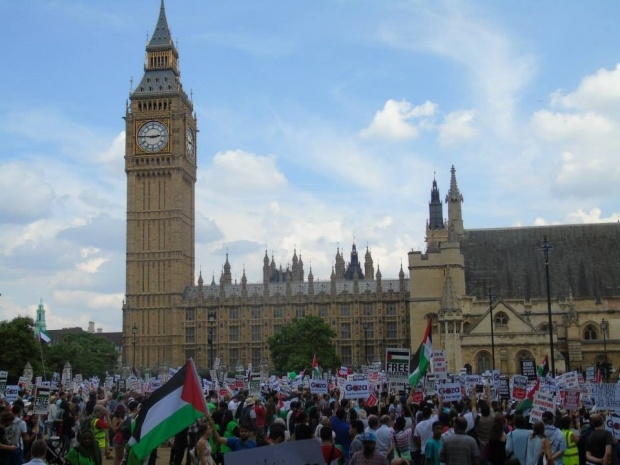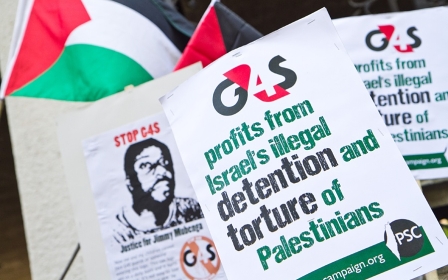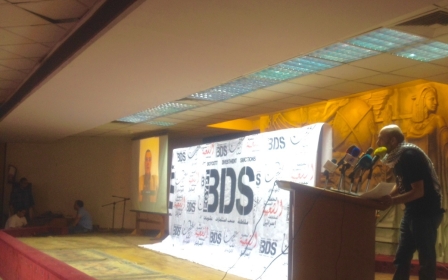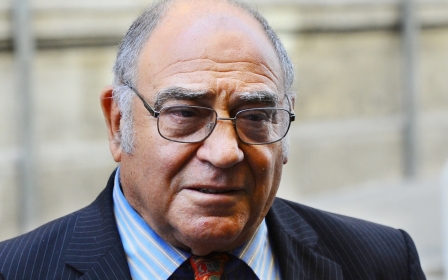Global protests condemn G4S for alleged role in Israeli prisoners' rights abuses

A year after protesters sent a British security firm’s annual general meeting into chaos, activists confirm that they plan to target this year’s G4S shareholder meeting, scheduled for 4 June at London’s Excel Centre.
Stop G4S, a network that has demonstrated against the company in the past, announced the plans Monday on its website. Participants will include supporters of migrants’ and prisoners’ rights, as well as Palestine solidarity activists.
News of the plans for the shareholder meeting come after protests were held in countries across the world in March for the "Hares Boys".
The five teenagers have been held in a G4S-secured prison for adults for more than two years on attempted murder charges. The only proof against them are their confessions which supporters say were taken under duress in prison.
The world’s largest security firm and second-biggest private employer, G4S has faced boisterous protests for years for providing security systems and other services to Israeli prisons and detention centres, including facilities in which human rights groups have documented torture and poor treatment of Palestinian prisoners, including children.
Since an official campaign was launched against the company in 2012, the company has lost public, university and institutional contracts and seen stockholders, including the Bill and Melinda Gates Foundation and the United Methodist Church, divest.
South African anti-apartheid stalwarts Archbishop Desmond Tutu and Ahmed Kathrada, joined by international lawyers, politicians and actors, wrote a public letter calling on G4S to cut its ties with Israel.
Most recently, Palestine solidarity activists marked Palestinian Prisoners’ Day on 17 April by protesting against the company in Glasgow and Manchester, as well as invading its headquarters in London.
Simultaneously, BDS activists in South Africa announced that more than 20 companies in the country had ended their contracts with G4S.
“G4S tells us it is ‘securing our world’,” Diana Neslen of Stop G4S, which organised the London protest, told Middle East Eye. “On the contrary, G4S is securing Israel's apartheid.”
Meeting with protest
Eyes are on the June shareholder meeting after last year’s gathering descended into chaos, with 30 protesters disrupting it seven times – and G4S guards violently removing 25 of them.
At the end of the meeting, the company said it would end its contracts with Israeli prisons as they expire over the next two years. G4S CEO Ashley Almazan also confirmed earlier statements that the company will not renew contracts connected to Ofer Prison, checkpoints and the West Bank police headquarters when they run out this year.
While celebrating the company’s statement, activists have held that their campaign will continue until G4S breaks all of its business ties with Israel. Although G4S’ major clients in Israel are various government departments, the company also has contracts with commercial and residential clients in settlements. Campaigners want change now.
The outcome of last year’s meeting “does little to help Palestinian prisoners in Israeli jails right now”, said Tom Anderson, a researcher for Corporate Watch, which has studied G4S’ presence in Israeli prisons and settlements through interviews with former Palestinian prisoners in the West Bank and the Gaza Strip.
“G4S must pull of their contracts immediately,” Anderson said.
G4S’ media centre did not respond to a request by MEE to comment on the campaign and clarify its plans for ending Israeli contracts.
In 2013, the Financial Times reported that the company’s Israel operations had earned it £100 million in sales the previous year, one percent of both its global revenues and its profits.
The Hares Boys
The case of five Palestinian teenage boys, held in a G4S-serviced prison for adults for the past two years, has become a focal point of the campaign against the company - and garnered events in cities around the world in March on the anniversary of their incarceration.
The boys' supporters say Israeli captors in G4S-supported prisons used torture to coerce them to make confessions which, without eyewitnesses or material evidence, became the only proof against them, supporters say.
The teenagers were among 19 Palestinian boys arrested after a West Bank car crash on 14 March 2013. Adva Biton was driving on Road 5 with her three daughters back to the Israeli settlement of Ariel where they live when she hit a truck.
The truck driver initially testified that he had pulled over to change a flat tyre, say campaign organisers, but later changed his story, claiming instead that he had seen stones lying by the side of the road.
The collision injured Adva Biton and three of her daughters, one seriously. Adele Biton, then age three, fought severe brain trauma before dying this February of pneumonia.
In the early morning hours of 15 March 2013, Israeli soldiers invaded houses in the nearby village of Hares, launching a series of raids and detentions that continued for more than a week.
Solitary confinement
What happened next highlights what campaigners and researchers say is an Israeli pattern of detentions, investigations, trials and incarcerations.
Although G4S representatives have stressed that the company does not operate facilities, but rather provides security equipment to Israeli prisons, activists and campaigners hold that the company is complicit in violations of international law which occur within them, including the Hares boys’ experience.
Taken to the children’s unit at al-Jalame Prison near Haifa in northern Israel, supplied with G4S security systems, the 19 boys were held in solitary confinement with some reports indicating they were held for up to two weeks.
“When I visited him for the first time, he told me that they beat him all the time, until the blood was coming from his face and from his mouth,” said Um Fadi Shamlawi, the mother of one of the boys, Ali Shamlawi, in July 2014.
“They did not let him sleep for three days,” she added, saying that her son’s jailors had isolated him in a small cell and denied him food and water during his interrogation.
Ali made similar charges in a March 2014 affidavit to Defense for Children International Palestine (DCIP), recanting his confession and alleging Israeli interrogators had obtained it under duress.
“The boys were arrested and held in solitary confinement solely for interrogation purposes, which is considered a form of torture under international law,” Brad Parker, international advocacy officer and attorney at DCIP, told MEE.
This February DCIP reported an ongoing pattern of torture and abuse against detained Palestinian children with the apparent goal of coercing confessions, often for rock-throwing, a pattern that would seem to mirror the experience of the boys.
During their interrogations – the first, and often harshest, part of Israeli imprisonment – many children are held in solitary confinement for an average of 15 days. Half are strip-searched, while over three-quarters face physical violence, according to the DCIP report.
“Our evidence shows that when Palestinian children are held in solitary confinement they are beaten and intimidated, and denied access to counsel by Israeli authorities,” Parker said.
The boy’s incarceration in the prison, outside the occupied West Bank, is itself a violation of Article 76 of the Fourth Geneva Convention, which states: “Protected persons accused of offences shall be detained in the occupied country, and if convicted they shall serve their sentences therein,” Parker said.
‘No justice to be found’
After interrogating the boys, the Israeli forces released most of them, but transferred five to the Megiddo Prison, an adult facility administered by the Israeli prison service and equipped by G4S, where they remain today.
Each faces 25 charges of attempted murder – one for each stone allegedly thrown – and a possible sentence of 25 years.
On 23 April, Samidoun: Palestinian Prisoner Solidarity Network, a support group in North America, announced the boys would finally face military trials over the following month, starting with Ali on 30 April. With no eyewitnesses or material evidence, the boys’ confessions are the only proof against them, their supporters say. However, allegations of the boy’s torture are unlikely to sway an Israeli military court, which rarely excludes such statements from evidence, said DCIP’s Parker.
“When basic and fundamental fair trial rights are systematically denied to children it is clear that the military court system isn’t interested in justice. They are interested in confessions, convictions and control,” Parker said.
Other supporters agree that Israel’s military prosecutions of Palestinians like the Hares boys aim to cement its control over occupied Palestinian lands.
“The military courts that charge and try Palestinian children and youth are part and parcel of the occupation,” Samidoun coordinator Charlotte Kates told MEE. “They are not courts of justice in any meaningful sense of the term, but exist solely as apartheid mechanisms of oppression. It should be appalling to the world that children are being tried in these kangaroo courts.”
An Israeli military spokesperson did not respond to a request by MEE to comment on the case.
Demonstrations marking the second anniversary of the Hares detentions stretched from Glasgow, Scotland to Santiago, Chile, spanning four continents. In London, New York and Montevideo, Uruguay, protests focused on G4S and its support of the Megiddo prison.
“We know that there is no justice to be found in an Israeli military court system that convicts Palestinians at a 99.7 percent rate,” Ashley Cunningham, a campaign organiser, told MEE after the New York protest.
“As demonstrated by the number of solidarity actions around the world calling for their freedom, justice-seeking people will continue to act until these boys are free.”
New MEE newsletter: Jerusalem Dispatch
Sign up to get the latest insights and analysis on Israel-Palestine, alongside Turkey Unpacked and other MEE newsletters
Middle East Eye delivers independent and unrivalled coverage and analysis of the Middle East, North Africa and beyond. To learn more about republishing this content and the associated fees, please fill out this form. More about MEE can be found here.




